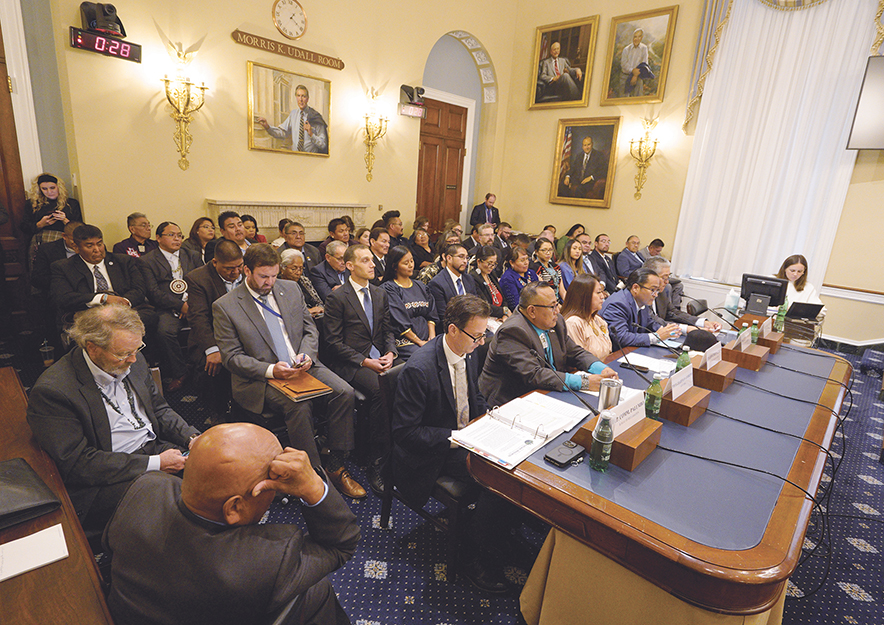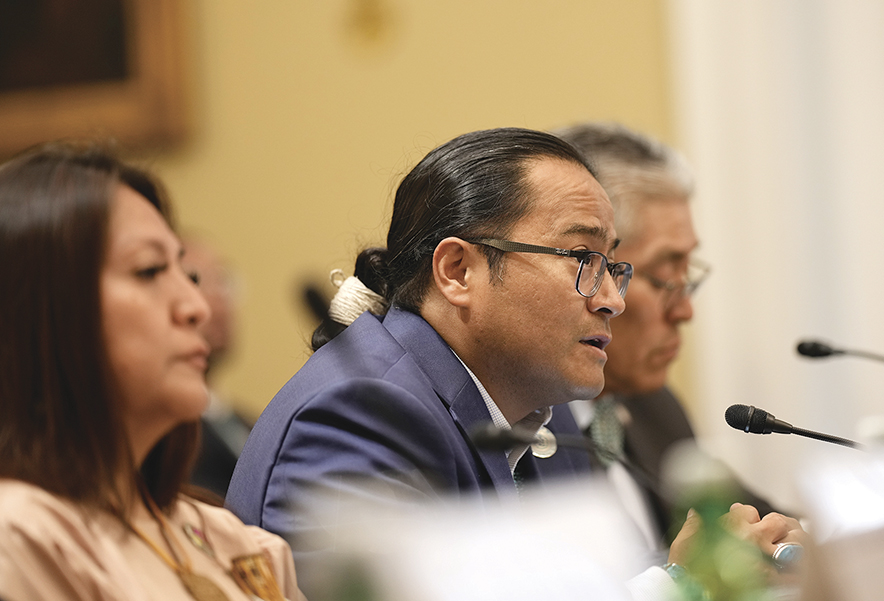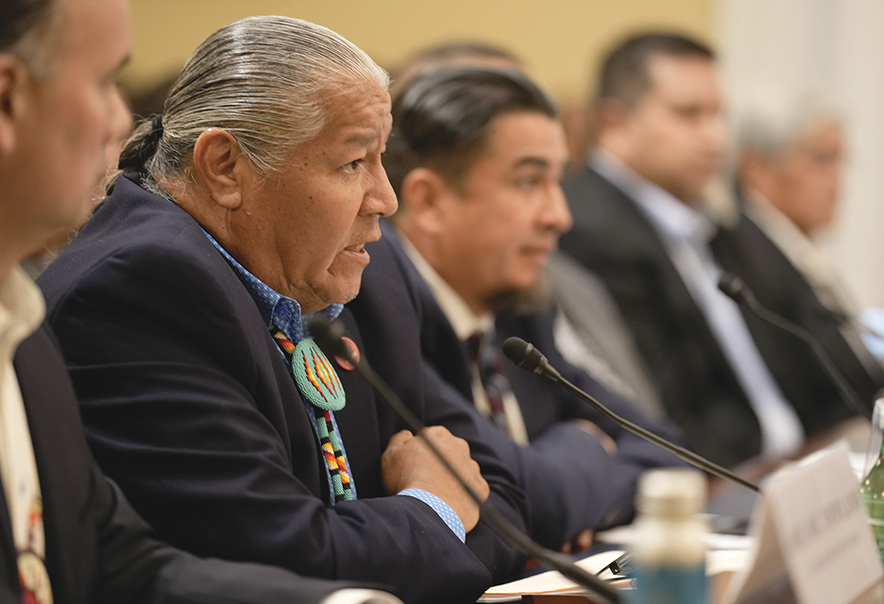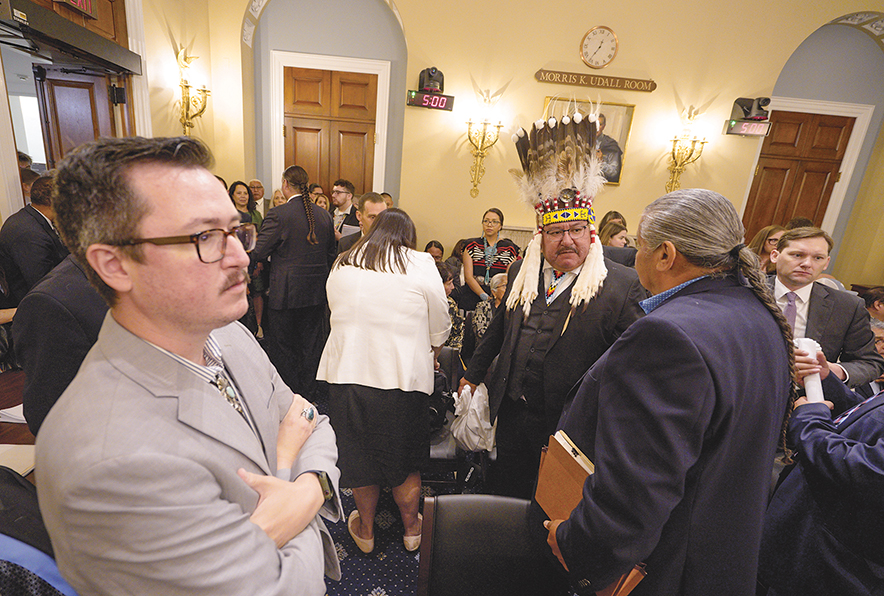
Navajo Nation, Hopi Tribe testify on water rights legislation in Congress

Special to the Times | Donovan Quintero
Leadership from the Navajo Nation, the Hopi, and the San Juan Southern Paiute tribes meet before the U.S. House Natural Resources Subcommittee on Water, Wildlife and Fisheries inside the Morris K. Udall Room in the Longworth House Office Building in Washington, D.C.
By Donovan Quintero
Special to the Times
WASHINGTON, D.C. — As he looked out the window from his Washington, D.C., hotel Hopi Vice Chairman Craig Andrews said he prayed to the rain clouds that began forming over the city skyline.
Andrews watched the clouds form into columns, which he said was a good sign to his people.

Special to the Times | Donovan Quintero
President Buu Nygren speaks before the U.S. House Natural Resources Subcommittee on Water, Wildlife and Fisheries inside the Morris K. Udall Room in the Longworth House Office Building in Washington, D.C., on July 23.
“So, I started to pray. And in our way, in the Hopi way, when you see columns of clouds standing, that’s a really, really good sign,” he said on Tuesday after testifying alongside Navajo Nation President Buu Nygren, Yavapai-Apache Nation Chairwoman Tanya Lewis, Governor Pueblo of Taos Fred Romero, and Governor Pueblo of Acoma Randall Vicente. “It’s seldom that you see anything like that. So, it’s very, very, very sacred. And that’s what I experienced coming here. So that was a sign to me, along with the rain.”
The tribal leaders testified before the House Natural Resources Committee, Subcommittee on Water, Wildlife and Fisheries to advocate for the passage of the Northeastern Arizona Indian Water Rights Settlement.
Lewis was on hand to advocate for H.R. 8949, the Yavapai-Apache Nation Water Rights Settlement Act of 2024, while Governors Romero and Vicente were on hand for H.R. 6599, the Technical Corrections to the Northwestern New Mexico Rural Water Projects Act, Taos Pueblo Indian Water Rights Settlement Act, and Aamodt Litigation Settlement Act, and H.R. 1304, the Rio San José and Rio Jemez Water Settlements Act of 2023.
Nygren presented his views on H.R. 8940, the Northeastern Arizona Indian Water Rights Settlement Act; H.R. 3977, the Navajo-Gallup Water Supply Project Amendments Act of 2023; H.R. 8945, the Navajo Nation Rio San José Stream System Water Rights Settlement Act of 2024; and H.R. 6599, which encompasses technical corrections to the Northwestern New Mexico Rural Water Projects Act, the Taos Pueblo Indian Water Rights Settlement Act, and the Aamodt Litigation Settlement Act.
‘Landlocked and water-locked’
Craig Andrews testified on behalf of Hopi Chairman Timothy Nuvangyaoma who recently had surgery. Andrews told the House Natural Resources Committee when the U.S. created the Hopi reservation, it cut the Hopi people off from their traditional water sources. He didn’t elaborate on specific water sources.
“It cut us off … it landlocked and water-locked us and completely surrounded us with the Navajo reservation. The Hopi reservation stands separated from many of our traditional water sources,” Andrews testified. “Our ancestors have resided in northeastern Arizona since time immemorial. Upon emergence into this world, our people encountered the deity who I’ll refer to in English as the original caretaker, who gave us his blessing to live on the land.”
If the water rights settlement is approved, Andrews said it will ensure that the Hopi people will have water for current and future needs.
“I am proud that the parties were able to come together in the midst of this crisis to produce a settlement that will benefit all of our communities and offer all of our future generations water security,” he said.
Settling water rights
Buu Nygren testified on several legislations aimed at settling Indian water rights claims across Arizona, New Mexico, and Montana, which collectively represent a financial commitment exceeding billions of dollars.
During a three-and-a-half-hour hearing, Nygren emphasized the importance of H.R. 8940, stating that it would ratify the historic settlement agreement involving the Navajo Nation and 38 other parties, including the Hopi Tribe, the San Juan Southern Paiute Tribe, the United States government, and the State of Arizona. He remarked that this legislation aims to resolve decades of costly litigation and uncertainty regarding water rights in the region, ultimately providing clarity and security for users throughout the Colorado River Basin.

Special to the Times | Donovan Quintero
Jeffrey Stiffarm, the president of the Assiniboine and Gros Ventre nations of the Fort Belknap Indian Community in Harlem, Montana, speaks for his people during the Northeastern Arizona Indian Water Rights Settlement Act hearing in Washington, D.C.
The president said he spoke from personal experience as he told the committee that nearly one-third of Navajos still did not have access to clean running water.
“Roughly a third of all Navajo households lack running water, including the home I grew up in. Thousands of our people continue to haul water, thirty miles round trip to meet their daily water demands,” Nygren testified.
He added that the settlement would resolve water rights claims for three Indigenous nations, as well as invest in “desperately” needed water infrastructure projects that would deliver safe and reliable drinking water.
The committee acknowledged its primary role in authorizing the legislative resolution of Indian water rights claims, reinforcing the longstanding policy of the United States, which favors negotiated settlements over litigation.
Nygren’s and Craig Andrews’s testimony comes at a time when water scarcity issues are increasingly critical due to ongoing drought conditions affecting the Southwestern United States. The proposed legislation seeks not only to finalize existing agreements but also to lay the groundwork for future water management strategies that can benefit both tribal and non-tribal stakeholders.
Enhancing water infrastructure
H.R. 3977, for instance, which Gallup Mayor Louis Bonaguidi hopes is passed, proposes amendments to the Navajo-Gallup Water Supply Project, aimed at enhancing water delivery structures and ensuring that the needs of the Navajo Nation are adequately met. Meanwhile, H.R. 8945 addresses specific stream system rights for the Navajo Nation, enabling a clearer understanding of water allocations in the Rio San José area.
Bonaguidi said he was in Washington, again, to show his support for the passage of H.R. 3977 New Mexico Rep. Teresa Leger Fernández’s Navajo-Gallup Water Supply Project Amendments Act of 2023.
“When I first got elected in 2020, they said the water was supposed to be in Gallup in 2024. And then (the) Bureau of Reclamation says it’s going to be 2029. Now it’s 2030. And the thing is, it’s 80% done. I mean, the pipe is in the ground, and we got a reservoir,” Bonaguidi said before the start of the hearing.
The Gallup mayor added the city currently has 17 wells that provide water to the city. With another extension of the Navajo-Gallup Water Supply Project, he said the city has to add six more wells for $6 million each.
“We’ve been putting money into this project for ten years now,” the Gallup mayor said.
On why the project was being extended again, Bonaguidi surmised that politics between the Republicans and Democrats was probably the reason.
“I don’t know if it’s politics, Republicans against Democrats,” he said.
The mayor joked and said he told lawmakers he would not stop coming to D.C. to bug them until they pass the legislation.
“I told them yesterday (Monday), I says, ‘You know, I’m gonna keep coming up here and bugging you to a point where you finally say, let’s just get it done,’” he said.
Longstanding water rights issues
Buu Nygren’s testimony marks a step forward in addressing longstanding water rights issues, necessitating unified efforts in legislative resolution and cooperative water management among Indigenous nations and federal entities.
The proposed bill, if enacted into law, will allocate substantial funds for the acquisition, construction, and maintenance of essential water development and delivery projects. One of the key components of this initiative is a distribution pipeline projected to cost approximately $1.75 billion. This infrastructure will not only improve water delivery but also ensure that tribes gain reliable access to this vital resource, which has long been a concern in areas dependent on the Colorado River.
Specifically, the bill would allow the three tribes to secure over 56,000 acre-feet of Colorado River water each year. To put this into perspective, an acre-foot of water can sustain an average American household for an entire year.
Additionally, the bill outlines provisions for specific groundwater rights and protections, increasing the tribes’ ability to manage their water resources sustainably. This component within the legislation is critical since the three tribes have historically faced challenges securing adequate water rights, often exacerbated by complex legal and historical factors. By establishing clearer rights and protections, the legislation seeks to empower each of the tribe’s communities.
The introduction of this bill comes at a crucial time when water scarcity issues are escalating due to prolonged drought conditions and increasing demand for water in the southwestern United States. Tribal communities, many of which have limited access to clean and reliable water sources, stand to benefit greatly from this legislative effort. Ensuring that they have the necessary infrastructure to support their water needs not only helps to address current shortages but also lays the groundwork for future sustainability.
Hauling water daily, land for San Juan Southern Paiute
First lady Jasmine Blackwater-Nygren, who also attended the hearing, said she was compelled to attend the hearing because of its historic importance, and to support her husband.
I wanted to be here for these moments, and I wanted to support my husband and the administration,” she said.

Navajo Times | Donovan Quintero
Council Delegate Carl Slater stands in the crowd during Tuesday’s hearing for the Northeastern Arizona Indian Water Rights Settlement Act in Washington, D.C.
Blackwater-Nygren said she was on the edge of her seat at times because she wasn’t sure if some of the committee members were asking their questions. After all, they were against or for passing the legislation.
“I was sitting at the edge of my seat at times. I feel like I was holding my breath because you really couldn’t tell with some of the questions — which way the members of the committee were leaning, whether they were leaning in favor, or they had serious questions or if they were opposed,” the first lady said.
The former Arizona state legislator said she, the same as her husband, also grew up without running water, and so, understood the hardships that come with it.
“There was a time that I also grew up without running water. And I think that it’s a real hardship for our people,” Blackwater-Nygren said. “Because in those moments, not having running water teaches you about water conservation and hard work.”
She added that while not having running water teaches important lifelong lessons, it is important to not forget the hardships it also puts on Navajo families, single mothers, the elderly, and people who do not have vehicles.
“It’s important to remember that these people who are dealing with this, some of them, they don’t have the ability to haul water every day. They don’t have gas money to go to the chapter house, and some of them don’t have the vehicles to haul water every day,” Blackwater-Nygren said. “There’s a lot of single moms who don’t have running water. There’s a lot of elders don’t have running water. And as they get older and older, it’s becoming more and more difficult for them to be able to have their own water and then also take care of themselves on top of that. So, I think it’s a real hardship.”
After the meeting, Andrews said his prayer was for all of the people, and not just for himself.
“You ask for not just for yourself, but the people who are working alongside you, and the people that are here, and for tribal members, we’re all focused on one thing,” he said. “So, I’m giving them encouragement by praying for them, not just solely for myself, but for others. So, we can all be unified altogether for this purpose. Just like any other ceremony, you pray for others instead of just for yourself.”
San Juan Southern Paiute President Robbin Preston Jr. was on hand but did not testify, as he sat and listened quietly. If the legislation is approved, his tribe would also get access to water, as well as provide land for the San Juan Southern Paiute people.








 Highway 264,
Highway 264, I-40, WB @ Winslow
I-40, WB @ Winslow